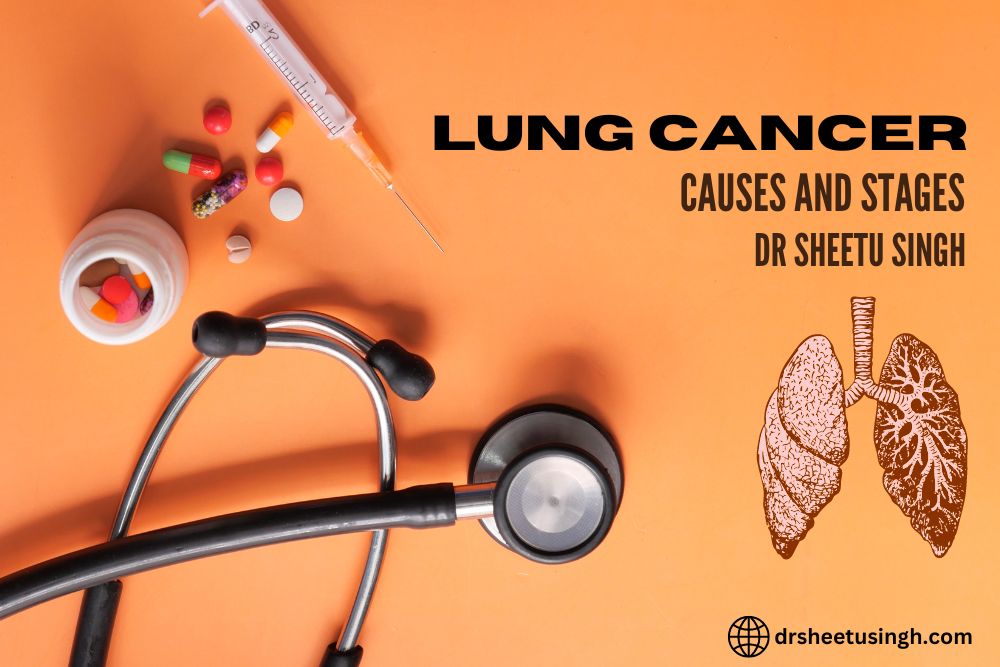Lung Cancer: Causes and Stages

Cancer is any abnormal growth of cellular mass due to the deposition of damaged cells dividing uncontrollably. It can be can spread from one part of the body to the other part. Cell division is a normal process of our body to replace damaged or worn-out cells, new cells replace the old cells during normal cell division, as every cell of our body has a life span of its own. Lung cancer process of cell division is highly regulated by different proteins and cell signalling mechanisms. If such a well-regulated mechanism fails to control normal cell cycle, and division, lumps of a cell are formed at different sites where the cell division disturbances occur.
Lung Cancer: Causes and Stages
In humans, lung cancer develops in the lungs. A lung cancer occurs when abnormal divisions of cells take place in the lungs. It can either occur in the bronchi or the alveoli. As obvious from the name itself, the lungs are the organs that control breathing, if the alveoli or bronchi are affected by the tumour formation, there will be difficulty in breathing along with other symptoms, that might or might not resemble other lung disorders.
Causes:-
According to Dr Sheetu Singh, Lung cancer formation occurs when the division rate is more than the required rate of cell division by the body. Normal cells have programmed cell death, and prevent unnecessary cell division, but cancerous cells fail to “switch off.” The cell division can be irregular and continuous. The lump of cells can become a tumour if there is an accumulation of cells in large numbers. This uncontrolled cell division can be unpredictable but many factors can be associated with this irregular growth of cells, which might include inhalation of harmful substances such as asbestos, arsenic or nickel etc., which can cause mutation in the normal cells.
The major cause of cancer in the lungs is smoking. Passive smoking and active smoking both cause the formation of an irregular mass of cells that is not control by the body’s natural mechanism to eliminate abnormal cells. This tissue can then develop into a tumour. Tumours can either be restricted to their site or origin or can spread through body fluids to other parts of the body as well.
Types:-
It is generally possible to categorize lung cancers into two broad categories:
– Small cell lung cancer- This type of lung cancer occurs in about 15-20% of total people, that too in heavy smokers. It is a less common form of lung cancer but is more aggressive than NSCLC. Because of its aggressive nature, cancer may be more difficult to cure or less responsive to treatments.
– Non-small cell lung cancer- NSCLC makes up a total of 80-85% of total lung cancer cases and is the most common type of lung cancer. This type of cancer includes adenocarcinoma, squamous cell carcinoma and large cell carcinoma. NSCLC responds to the therapies used as a part of cancer treatment.
Stages:-
Like any other cancer, lung cancer also develops and spreads in stages, if remains undiagnosed and untreated. The progression of stages of lung cancer includes stages from zero to four.
- Initially, stage 0 occurs in the bronchi.
- Stage I is inside the lung and the tumour has not outgrown the lungs.
- Stage II cancer is larger than stage I and has started spreading out to the lymph nodes which are inside the lungs.
- Stages III and IV are advancements in the tumours, as stage III includes tumour growth even to the lymph nodes outside the lungs and stage IV includes cancer formation in the other lung too.
Such progression of cancer decides the severity of cancer and hence the life of a person. Early diagnosis can lead to successful treatment with both therapy and medicine. In cases of fast tumour growth, it crosses the stage beyond which the treatment becomes impossible.
